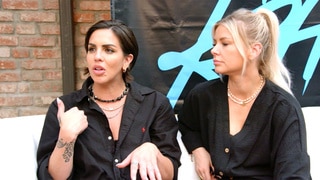
Create a free profile to get unlimited access to exclusive videos, sweepstakes, and more!
Here’s Why Every Workplace Should Offer Sensitivity Training and Inclusion Workshops
The Vanderpump Rules Girls' Night event started a serious conversation for the SURvers — and it's an important one for all of us to have.

Coworker drama is nothing new, but this season on Vanderpump Rules, the workplace feud a little different. Billie Lee and Katie Maloney-Schwartz got into it when Billie felt excluded from a party planning session at Katie’s apartment for a "Girls Night" event. The issue became magnified when Billie insinuated on social media that it was because she’s trans, but later clarified that she doesn't think the girls involved were transphobic.
On the Vanderpump Rules After Show, she explained that she thought her coworkers were “self-involved” and “not aware,” and wished she could have played a bigger role in "Girls Night," since it is a word she fought hard to use. (Watch for yourself in the clip above.) And even though Lisa Vanderpump and the SUR community have always been very supportive of Billie Lee and her journey, there are many people who have not had that same level of support or opportunities to share their feelings.
According to data from the Human Rights Campaign Foundation and Out & Equal Workplace Advocates, an organization that offers educational workshops on LGBTQ cultural competency training and inclusion strategies, 46 percent of LGBTQ workers report being closeted at work. Personal Space spoke with Isabel Porras, the director of Out & Equal’s training and professional development program “O&E University” to learn about "Gender in the Workplace Training" strategies — especially as it pertains to engaging with transgender, non-binary, and gender non-conforming colleagues.
Understanding Gender Sensitivities
Becoming more aware of how people self-identify and where they may be sensitive is important for everyday life, as well as at work. It makes sense that Billie is hypersensitive to this particular type of event because of what she has been through and how she's been excluded from women-only activities.
While that situation was very specific, there are many scenarios where employees may not feel comfortable enough to share that they are trans, let alone when they feel left out of things. According to data, 52.8 per cent of LGBTQ employees report discrimination that negatively affected their work environments. If someone has felt this way at a previous job, it could explain why they may be extra sensitive, or jump to conclusions if they feel it may be happening again.
Using Preferred Pronouns
According to Porras, if a company is looking to create a more aware workplace environment, a good place to start is establishing “a framework for sharing pronouns early on.” This simple step reduces “uncomfortable encounters in which employees are mis-gendered or colleagues are unclear about how to address one other.”
Porras offered some organic ways to share preferred pronouns, including using them in email signatures, name tags, or in HR documents. It is also important to specify that sharing this information and language is optional, and “it should not be mandated to identify” if they don’t choose to do so. “The point in including pronouns in introductions is to create a space for individuals to voluntarily provide their pronouns.”
Porras also noted that if you are unsure of someone’s pronouns, it’s OK to ask them respectfully.
Workplace Inclusion Training
If these issues continue to arise, offering LGBTQ inclusion training to the entire company is a good way to help coworkers become more inclusive and aware of what could trigger sensitivities. “Ensuring that employees understand key concepts surrounding gender, while building skills in empathy and ally-ship is critical to the development of an inclusive environment,” Porras explained.
“Workplace education should utilize an intersectional approach to instill an awareness of how the combination of multiple identities (including race, sexual orientation, gender identity, and others) create different experiences of privilege and marginalization in the workplace.” Offering inclusion workshops can be effective for increasing awareness in the office, as well as outside of work, too.






























